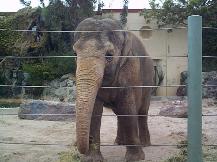Stress and Obesity Killing Teenage Inmates
Elephant inmates, that is.
Two recent studies comparing the health of wild elephants to that of captive ones just concluded that—golly jeepers—free-roaming animals don’t fare very well if they’re kidnapped from their mothers and kept for life in cages—excuse me—”zoo exhibits.” You see, 8,000-pound elephants physically require exercise, including being active for up to 18 hours per day (sometimes covering as much as 30 miles of open wilderness in a herd of closely-knit family members). It turns out that they frequently experience fatal side effects when they are reduced to pacing around enclosures that are typically just a fraction of an acre of unnatural habitat (or a couple of acres if they’re really lucky). Imagine life in the circus, where elephants are kept in shackles almost every hour of their life, standing in feces and urine, swaying from one foot to the other.
Here are a few of the not-so-happy findings:
- For African elephants, the average lifespan in captivity was only 16.9 years compared to 56 years in the wild. Asian elephants in zoos are 18.9 years old, on average, when they die, while Asian elephants in timber camps, where they spend most of the day living as they would in the wild, live 41.7 years.
- The vast majority of elephants in zoos are stressed and overweight.
- Infant mortality rates are two to three times higher for those born in zoos compared to births in logging camps.
- Early death was also more likely to occur in captive animals who were born in the wild or transferred between zoos. Dr. Clubb says this is probably caused by the stress of being taken away from their herds, mothers, or family groups.
Strangely, Steve Feldman, spokesperson for the Association of Zoos and Aquariums (AZA) said something about these findings not applying to US zoos, as the studies were conducted in European zoos. Really? Try telling that to the 63 elephants who have died at AZA-accredited facilities since 2000—more than half never reached the age of 40. And with AZA’s pathetic space recommendations for elephants, which are about the size of a 3-car garage, elephants in the U.S. commonly develop deadly foot problems and arthritis.
The point, to state the obvious, is that stealing animals and using them for exploitative entertainment is outdated, unnecessary, and—hello?—wrong, and these studies give scientific evidence of it. No matter how eloquently zoos attempt to justify keeping animals in captivity to make a profit, caging elephants (or any wild animals, for that matter) is just flat-out indefensible and should be abandoned.
Written by Missy Lane


